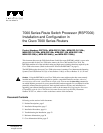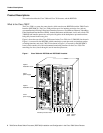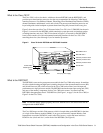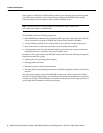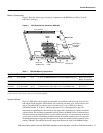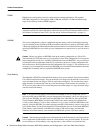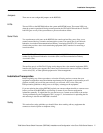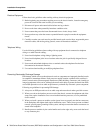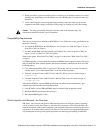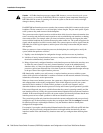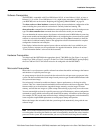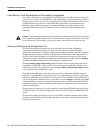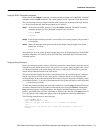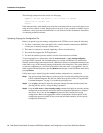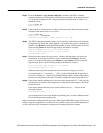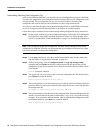
6 7000 Series Route Switch Processor (RSP7000) Installation and Configuration in the Cisco 7000 Series Routers
Product Descriptions
DRAM
DRAM stores routing tables, protocols, and network accounting applications. The standard
RSP7000 configuration is 16 megabytes (MB) of DRAM, with up to 128 MB available through
single in-line memory module (SIMM) upgrades.
Note When upgrading DRAM, you must use SIMMs from an approved vendor. To ensure that you
obtain the most current vendor information, obtain the list from Cisco Information Online (CIO) or
the Technical Assistance Center (TAC). (See the section “Software Prerequisites” on page 11.)
NVRAM
The system configuration, software configuration register settings, and environmental monitoring
logs are contained in the 128-kilobyte (KB), nonvolatile random-access memory (NVRAM), which
is backed up with built-in lithium batteries that retain the contents for a minimum of five years. When
replacing an RSP7000, be sure to back up your configuration to a remote server so you can retrieve
it later.
Caution Before you replace an RSP7000, back up the running configuration to a Trivial File
Transfer Protocol (TFTP) file server so you can retrieve it later. If the configuration is not saved, the
entire configuration will be lost—inside the NVRAM on the removed RSP7000—and you will have
to reenter the entire configuration manually. For instructions on how to save the configuration file,
refer to the section “Saving and Retrieving the Configuration File” on page 12. This procedure is not
necessary if you are temporarily removing an RSP7000 you will reinstall; lithium batteries retain the
configuration in memory until you replace the RSP7000 in the system.
Flash Memory
The imbedded or PCMCIA card-based Flash memory allows you to remotely load and store multiple
Cisco IOS and microcode images. You can download a new image over the network or from a local
server and then add the new image to Flash or replace the existing files. You can then boot routers
either manually or automatically from any of the stored images. Flash memory also functions as a
TFTP server to allow other servers to boot remotely from stored images or to copy the stored image
into their own Flash memory.
Note If you have a Flash memory card installed in the PCMCIA slot of your RP, and you are
replacing an RP with an RSP7000, you must reformat the Flash memory card if you want to use it
with your new RSP7000. You must install the RSP7000 in the 7000 RSP slot, have an RSP7000
Chassis Interface (RSP7000CI) installed in the 7000 CI slot, and be running Cisco IOS Release
10.3(9), or later, Release 11.0(6), or later, or Release 11.1(1) or later, for the new RSP7000 to work
properly. Using the RSP7000, you cannot read data on the RP’s Flash memory card, nor can you use
it as bootable media. You must reformat the RP’s Flash card before you can use it with the RSP7000.
Flash memory cards formatted on the RP-based systems (7000 series routers) are formatted
differently from Flash memory cards formatted on RSP-based systems (7500 series routers).
Caution The formatting procedure erases all information on the Flash memory card. To prevent the
loss of important data that might be stored on a Flash memory card, proceed carefully. If you want
to save the data on a Flash memory card, copy the data to a server before you format the card.



